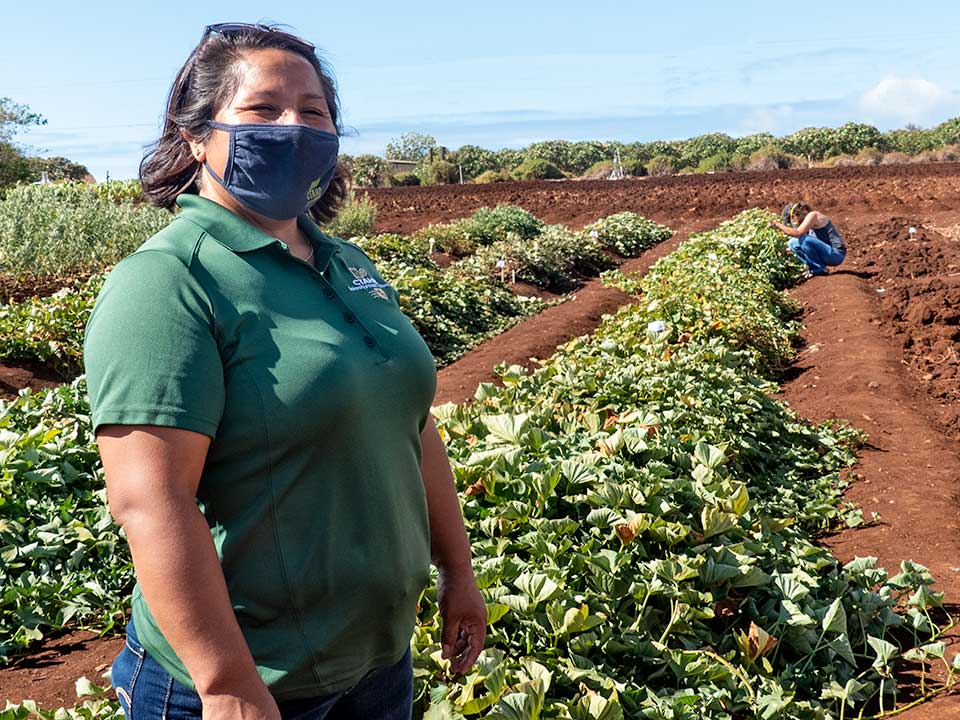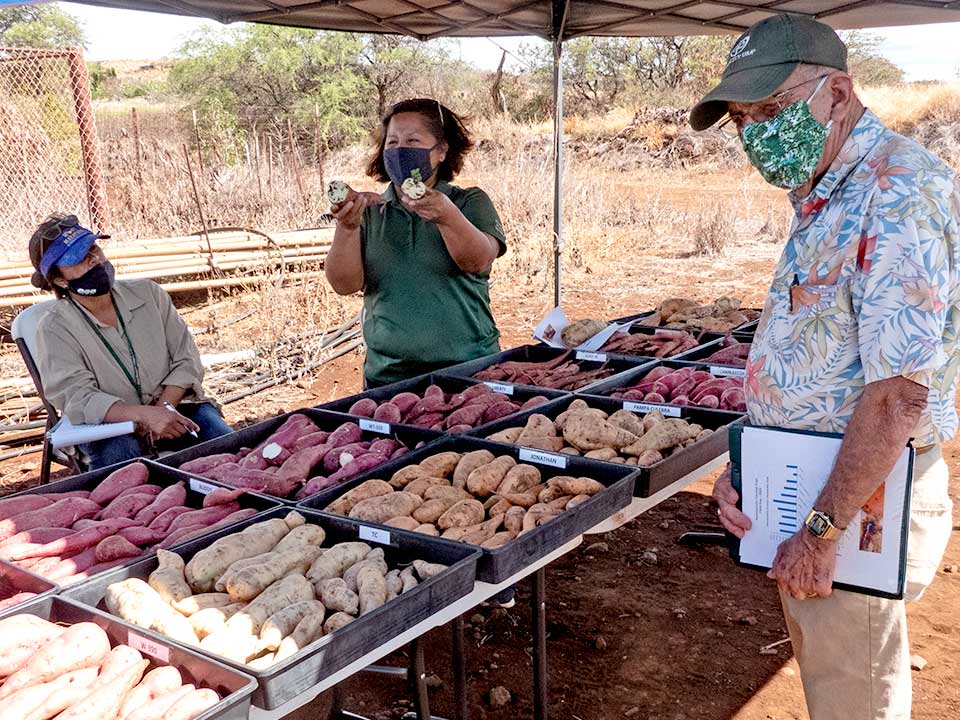Maui News –
by Kehaulani Cerizo –
New crops go to market; 3,500 acres of plantings slated this year –
Wind. Drought. Pests. Farming in Central Maui already holds a unique set of challenges. Add a global pandemic and agriculture operations are tested in a whole new way.
So Mahi Pono, the largest agriculture company on Maui, has made key changes to its operations in light of coronavirus.
The pandemic affected everything from shipping costs — a 46 percent increase in Young Brothers rates took effect last year — to in-field work that needed COVID-19 safety protocols. Restaurants and hotels — major markets for local produce — closed, causing the company to look at the type and scale of its crops.
One bright spot of the pandemic is that it emphasized the need for food sustainability, making farming more essential than ever, Mahi Pono officials said.
“We’re an island state that continues to import about 90 percent of all of our food; that makes us vulnerable every time there’s a natural disaster, shipping issues or a global pandemic,” said Shan Tsutsui, Mahi Pono chief operating officer.
During a recent farm tour, Tsutsui and Mahi Pono officials discussed the pandemic’s impact on last year’s farm plan and products made available in 2020, along with adjustments they’ve made to this year’s plan.
They highlighted the Chef’s Corner project, a test plot for new crops; the progress of the company’s community farm, which rents parcels to local farmers; and recent plantings that have done surprisingly well, including watermelon, broccolini, kale and green beans.
Instead of producing a signature crop, Mahi Pono wants to be known for an array of locally grown foods — a big departure from the monocrop of sugar cane that has occupied Central Maui fields for more than a century.
“Transforming former sugar cane fields into diversified agriculture is not an easy task,” Tsutsui said. “It takes time, hard work and financial commitment.”
Watermelon for the people
Chase Stevenson, Mahi Pono Chef’s Corner farm manager, showed off its rows of green, yellow and purple beans, butternut and kabocha squash, red kale, green kale, dinosaur kale, bok choy, green onions and orange sweet potato.
The corner, comprising about 40 acres of organically managed land off Maui Veterans Highway, tests what works best for Mahi Pono farmers and for the market, Stevenson said. From there, farmers scale and grow. Each time the crop is rotated, it improves the soil.
Stevenson, who has about a decade of Maui farming experience at Kula Agriculture Park and in Haliimaile, said farming in the central plains is both challenging and rewarding.
“You never know what you’re going to run into. It is fun even though it doesn’t sound fun — it keeps things interesting,” Stevenson said, laughing.
Some crops, such as watermelon, were a pleasant surprise. Watermelon grown on about a half-acre was consumed almost entirely by the local market with the remainder shipped to the Big Island, Tsutsui said. Because it was a hit, watermelon fields will be expanded with yields scheduled for summer.
Darren Strand, vice president of agricultural outreach and business development, said the company is learning that beans, broccolini and kale do really well, but with COVID-19 causing restaurant and hospitality markets to scale back, it’s hard to move produce that would typically sell easily.
“Anything you grow with a good quality and a consistent supply, you are going to be able to move,” Strand said. “Hopefully things are going to turn around in the next month or so and we will be positioned with this project, and some potatoes, onions and papayas, to be ready to hit that and run.”
Farther south, sweet onions are at various stages of growth, with some ready for April or May harvest. Non-GMO solo and sunrise papaya trees that were sticks last year have shot up and are producing well.
In all, Mahi Pono will plant more than 3,500 new acres of crops this year, according to Grant Nakama, vice president of operations.
Another program, the Mahi Pono community farm, expects tenants to move in by the end of this month. The program provides “farm ready” land, including water, to local growers for $150 per acre a year. Tentative agreements have been reached with 14 farmers and small businesses for an initial 60 acres. A second phase of community farmland will add more acreage, officials said.
Pivoting amid the pandemic
Despite the pandemic, Mahi Pono last year brought its products to market under the Maui Harvest brand. Potatoes were sold at Whole Foods in Kahului, Honolulu and Kailua; watermelon, KTA Market in Hilo; papayas, Takamiya Market in Wailuku; watermelon, potatoes, eggplant, Pukalani Superette; papayas, Target in Kahului; broccolini, Tamuras in Kahului and Lahaina; and watermelon, Times Supermarket in Kihei and Honokowai.
An extra emphasis was placed on row crops after the onset of the pandemic in order to provide more locally grown potatoes, onions and papaya.
“This shift allowed us to donate more than 60,000 pounds of produce to nonprofit organizations like Maui Food Bank, Hawaii Foodbank and Chef Hui that directly helped those in need,” Tsutsui said.
Another area of growth despite the pandemic was Mahi Pono’s staff. The company went from 150 employees at the start of 2020 to about 260 employees at the beginning of this year.
“As an essential business during the pandemic, we were fortunate to be able to continue farming, expand operations and hire more employees,” said Mark Vaught, vice president of farm development.
Vaught, Nakama and Tsutsui were promoted in 2020. Tsutsui succeeded Tim O’Laughlin, who relocated to California to focus on new initiatives for both Mahi Pono and Pomona Farming, a news release said.
When it cames to water in 2020, Nakama said Mahi Pono made “every effort to be efficient.”
In 2020 the company diverted an average of 22.7 million gallons per day from East Maui — below the state interim in-stream flow standards and half the allowable water allocation under the Alexander & Baldwin revocable permit, he added.
“The amount of water was the minimum needed to support our agricultural operations and to meet our obligations to the County of Maui for Upcountry residents and water users,” Nakama said.
Looking forward, he said the company will continue to divert only what is needed to meet crop and Maui County obligations.
For ‘generations to come’
Mahi Pono, a joint venture between a California farming company and a Canadian pension fund, acquired 41,000 acres of former sugar cane land and half of the East Maui Irrigation water delivery system from Alexander & Baldwin in late 2018.
Since the purchase, Mahi Pono officials have said they should be viewed separately from A&B, which has a controversial history of water use and sugar cane operations.
Still, Albert Perez, executive director and co-founder of environmental group Maui Tomorrow Foundation, said the future of the new company remains uncertain because A&B has a hand in its success due to A&B’s control of East Maui water rights.
He added that the foundation is working with regenerative farmers to provide Mahi Pono a list of suggestions that will boost soil fertility, reduce and eliminate the need for pesticides, minimize windblown dust and increase the water retaining capacity of the soil.
“However, we are hopeful that under the leadership of Maui native Shan Tsutsui, sustainable, value-added agriculture that provides local food security will truly be the goal,” said Perez, who recently toured the farm.
Tsutsui, the former Hawaii lieutenant governor, said his life has been dedicated to public service. He said he sees Mahi Pono, which provides student internships and nonprofit programs, as the next chapter of community outreach.
“For me, it has been rewarding to be able to be a part something that’s going to have a major, positive impact on our community for many generations to come,” he said. “Not only are we growing crops for consumption, but we are also ensuring that Central Maui will remain undeveloped and in agriculture well into the future.”
Tsutsui said that in its short time, Mahi Pono has been working tirelessly, especially during a pivotal pandemic year. This includes clearing the land, researching the best crops that would thrive in Central Maui’s soil and climate, investing in modern farming technology and equipment, planting and maintaining fields, and implementing a food processing system and distribution channels.
It also established relationships with distributors, wholesalers and chefs to get Maui Harvest produce into stores, restaurants and homes, he said.
But like all worthy endeavors, changing the course of history will take time, Tsutsui said.
“We still have a long a road ahead,” he said. “We really want the public to be patient and understand that this will take time, but we are committed to delivering quality, Maui-grown produce.”
* Kehaulani Cerizo can be reached at kcerizo@mauinews.com.
_______________
MAHI PONO 2021 FARM PLAN AT A GLANCE
Crops already in the ground:
• Citrus: More than 1,800 acres. Along Haleakala, Maui Veterans and Kuihelani highways and Central Maui interior fields.
• Coffee: More than 150 acres. Right below Pukalani.
• Potato: More than 50 acres. In western fields between Maui Veterans and Kuihelani highways.
• Onions: More than 50 acres. In western fields between Maui Veterans and Kuihelani highways.
• Papaya: More than 20 acres. In Central Maui interior fields.
• Avocado: More than 10 acres. Near Maui Humane Society and Maui Veterans Highway.
Planting this year:
• 3,500 more acres of citrus.
• 150 more acres of coffee.
• Replanting onions and potatoes.
• 20 more acres of papaya.
An additional 20 acres to be planted in the Chef’s Corner project (in western fields between Maui Veterans and Kuihelani highways), which will serve as a test plot for potential new crops.

